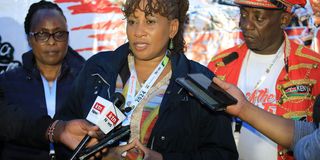STD cases rise in Naivasha as Safari Rally raves on

What you need to know:
- Speaking in Naivasha during the annual WRC Safari Rally, NSDCC Chief Executive Ruth Masha further warned the rise in STDs threatens progress of broader health initiatives.
- The medical official stressed the critical window for seeking post-exposure prophylaxis, citing data indicating that many individuals seek it late, often beyond the effective timeframe of 72 hours.
The National Syndemic Disease Control Council (NSDCC) has shared concerns over the surging cases of sexually transmitted diseases (STDs) among the youth.
WRC Safari Rally
Speaking in Naivasha during the annual WRC Safari Rally, NSDCC Chief Executive Ruth Masha further warned the rise in STDs threatens progress of broader health initiatives.
“When the youth get exposed to early sexual abuse, especially without condoms, what we know is that when they start becoming of reproductive age, then we find a lot of infertility cases,” said Dr Masha.
Dr. Masha further noted that adolescents are utilising preventive mechanisms to avoid contracting the diseases.
“This indicates these individuals have consistently been at risk and are waiting for an incident to occur before seeking intervention,” she observed.
New challenges
“Despite progress in HIV treatment and prevention, the surge in STIs poses a new challenge. The challenge arises when we observe a high demand for post-exposure prophylaxis, as it signifies that incidents have already occurred.”
The medical official stressed the critical window for seeking post-exposure prophylaxis, citing data indicating that many individuals seek it late, often beyond the effective timeframe of 72 hours.
Prophylaxis is the treatment given taken to prevent disease.
Delayed prevention
“Last year alone, over 114 individuals, including those who were victims of sexual assault, contracted HIV due to delayed intervention, it's imperative that individuals, regardless of the circumstances, seek prompt medical attention to access necessary interventions,” She said.
Highlighting the unpredictability of future incidents, Dr. Masha cautioned against complacency while underscoring the link between alcohol and substance abuse and increased HIV transmission rates, particularly among young people.
Unprotected sex
“You can't keep relying on post-exposure prophylaxis week after week, only to find yourself in the same situation later in the year. Whether it's a condom breaking or not having one available, many individuals attribute their risk-taking behavior to alcohol consumption. Approximately 6.5 percent of them admit to engaging in unprotected sex under the influence of alcohol or other substances, such as smoking,” She said.
Dr. Masha emphasised that decisions made today by young people could have long-term consequences, extending beyond immediate risks like pregnancies and HIV.
"We need to talk to them about cervical cancer, many young people are unaware that unprotected sexual intercourse can increase their risk of cervical cancer.”
She explained that efforts underscore a commitment to ensuring widespread accessibility and evidence-based provision of services which involves meticulous screening procedures for individuals disclosing instances like unprotected sex, facilitating access to preventative medication for HIV in high-risk situations.
“Our proactive stance ahead of the Safari Rally emphasises the importance of anticipating and addressing the needs of young people. Trained youth volunteers are strategically positioned to engage their peers, promoting responsibility and trust within the community.”
Joyce Ncece, Chief Officer of Public Health for Nakuru County, echoed Dr. Masha's concerns, noting a significant increase in STI and HIV cases within the county, particularly in areas like Naivasha where the rally was taking place. Despite efforts to provide resources and services, including condom distribution and HIV testing, the resurgence of STIs represents a setback in the fight against infectious diseases.
“We have seen increased cases of STIs and HIV within Nakuru County, more so Naivasha. And we want to associate that one with the rally that has been happening. And we have taken an initiative through the stakeholders at the NSDDC that they have taken their time to come and come with resources come with trainers, come with counsellors, talk to our youth,” she explained.
The WRC Safari Rally is a motor racing event held in Naivasha each Easter weekend. The event attracts thousands of youth, from as far as the neighbouring countries, and culminates with a fan fest party.





